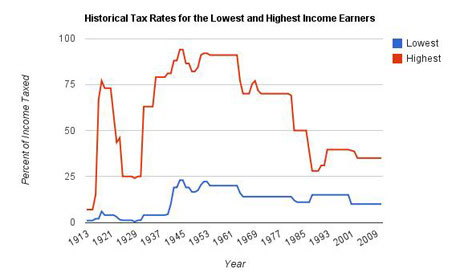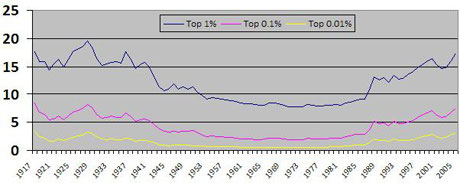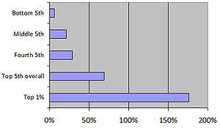This article was also published in The Guardian.
How the rich soaked the rest of us: The astonishing story of the last few decades is a massive redistribution of wealth, as the rich have shifted the tax burden.
Over the last half-century, the richest Americans have shifted the burden of the federal individual income tax off themselves and onto everybody else. The three convenient and accurate Wikipedia graphs below show the details. The first graph compares the official tax rates paid by the top and bottom income earners. Note especially that from the end of the Second World War into the early 1960s, the highest income earners paid a tax rate over 90 percent for many years. Today, the top earners pay a rate of only 35 percent. Note, also, how the gap between the rates paid by the richest and the poorest has narrowed. If we take into account the many loopholes the rich can and do use far more than the poor, the gap narrows even more.
One conclusion is clear and obvious: the richest Americans have dramatically lowered their income tax burden since 1945, both absolutely and relative to the tax burdens of the middle income groups and the poor.

Historical tax rates for the highest and lowest income earners.
Consider two further points based on this graph: first, if the highest income earners today were required to pay the same rate that they paid for many years after 1945, the federal government would need far lower deficits to support the private economy through its current crisis; and second, those tax-the-rich years after 1945 experienced far lower unemployment and far faster economic growth than we have had for years.
The lower taxes the rich got for themselves are one reason why they have become so much richer over the last half-century. Just as their tax rates started to come down from their 1960s heights, so their shares of the total national income began their rise. As the two other Wikipedia graphs below show, we have now returned to the extreme inequality of income that characterized the US a century ago.

Share of national income taken by top tranches of earners.
The graph above shows the portion/percentage of total national income taken by the top 1 percent, the top tenth of a percent, and the top 100th of a percent of individuals and families: the richest of the rich. The third graph compares what happened to the after-tax household incomes of Americans from 1979 to 2005 (adjusted for inflation). The bottom fifth of poorest citizens saw their income barely rise at all. The middle fifth of income earners saw their after-tax household income rise by less than 25 percent. Meanwhile, the top 1 percent of households saw their after-tax household incomes rise by 175 percent.

Relative increases in net household incomes of Americans from 1979 to 2005.
In simplest terms, the richest Americans have done by far the best over the last 30 years; they are more able to pay taxes today than they have been in many decades, and they are more able to pay than other Americans by a far wider margin. At a time of national economic crisis, especially, they can and should contribute far more in taxes.
Instead, a rather vicious cycle has been at work for years. Reduced taxes on the rich leave them with more money to influence politicians and politics. Their influence wins them further tax reductions, which gives them still more money to put to political use. When the loss of tax revenue from the rich worsens already strained government budgets, the rich press politicians to cut public services and government jobs and not even debate a return to the higher taxes the rich used to pay. So it goes – from Washington, to Wisconsin to New York City.
How do the rich justify and excuse this record? They claim that they can invest the money they save from taxes and thereby create jobs etc. But do they? In fact, cutting rich people's taxes is often very bad for the rest of us (beyond the worsening inequality and hobbled government it produces).
Several examples show this. First, a good part of the money the rich save from taxes is then lent by them to the government (in the form of buying US Treasury securities for their personal investment portfolios). It would obviously be better for the government to tax the rich to maintain its expenditures, and thereby avoid deficits and debts. Then, the government would not need to tax the rest of us to pay interest on those debts to the rich.
Second, the richest Americans take the money they save from taxes and invest big parts of it in China, India, and elsewhere. That often produces more jobs over there, fewer jobs here, and more imports of goods produced abroad. US dollars flow out to pay for those imports and so accumulate in the hands of foreign banks and foreign governments. They, in turn, lend from that wealth to the US government because it does not tax our rich, and so we get taxed to pay for the interest Washington has to give those foreign banks and governments. The largest single recipient of such interest payments today is the People's Republic of China.
Third, the richest Americans take the money they don't pay in taxes and invest it in hedge funds and with stockbrokers to make profitable investments. These days, that often means speculating in oil and food, which drives up their prices, undermines economic recovery for the mass of Americans and produces acute suffering around the globe. Those hedge funds and brokers likewise use part of the money rich people save from taxes to speculate in the US stock markets. That has recently driven stock prices higher: hence, the stock market recovery. And that mostly helps – you guessed it – the richest Americans who own most of the stocks.
The one kind of significant wealth average Americans own, if they own any, is their individual home. And home values remain deeply depressed: no recovery there.
Cutting the taxes on the rich in no way guarantees social benefits from what they may choose to do with their money. Indeed, their choices can worsen economic conditions for the mass of people. These days, that is exactly what they are doing.
Help us Prepare for Trump’s Day One
Trump is busy getting ready for Day One of his presidency – but so is Truthout.
Trump has made it no secret that he is planning a demolition-style attack on both specific communities and democracy as a whole, beginning on his first day in office. With over 25 executive orders and directives queued up for January 20, he’s promised to “launch the largest deportation program in American history,” roll back anti-discrimination protections for transgender students, and implement a “drill, drill, drill” approach to ramp up oil and gas extraction.
Organizations like Truthout are also being threatened by legislation like HR 9495, the “nonprofit killer bill” that would allow the Treasury Secretary to declare any nonprofit a “terrorist-supporting organization” and strip its tax-exempt status without due process. Progressive media like Truthout that has courageously focused on reporting on Israel’s genocide in Gaza are in the bill’s crosshairs.
As journalists, we have a responsibility to look at hard realities and communicate them to you. We hope that you, like us, can use this information to prepare for what’s to come.
And if you feel uncertain about what to do in the face of a second Trump administration, we invite you to be an indispensable part of Truthout’s preparations.
In addition to covering the widespread onslaught of draconian policy, we’re shoring up our resources for what might come next for progressive media: bad-faith lawsuits from far-right ghouls, legislation that seeks to strip us of our ability to receive tax-deductible donations, and further throttling of our reach on social media platforms owned by Trump’s sycophants.
We’re preparing right now for Trump’s Day One: building a brave coalition of movement media; reaching out to the activists, academics, and thinkers we trust to shine a light on the inner workings of authoritarianism; and planning to use journalism as a tool to equip movements to protect the people, lands, and principles most vulnerable to Trump’s destruction.
We urgently need your help to prepare. As you know, our December fundraiser is our most important of the year and will determine the scale of work we’ll be able to do in 2025. We’ve set two goals: to raise $104,000 in one-time donations and to add 1340 new monthly donors by midnight on December 31.
Today, we’re asking all of our readers to start a monthly donation or make a one-time donation – as a commitment to stand with us on day one of Trump’s presidency, and every day after that, as we produce journalism that combats authoritarianism, censorship, injustice, and misinformation. You’re an essential part of our future – please join the movement by making a tax-deductible donation today.
If you have the means to make a substantial gift, please dig deep during this critical time!
With gratitude and resolve,
Maya, Negin, Saima, and Ziggy
